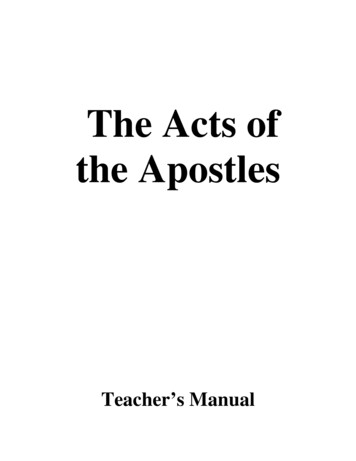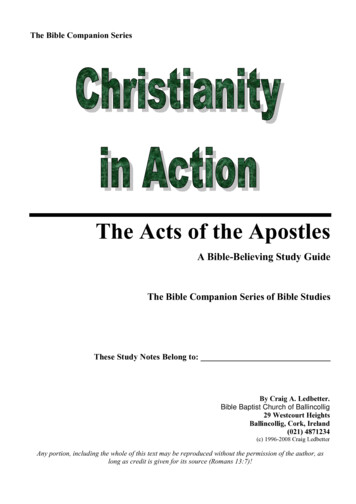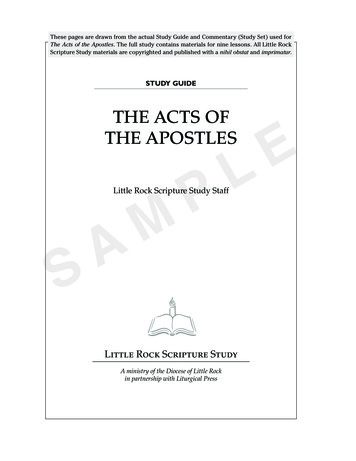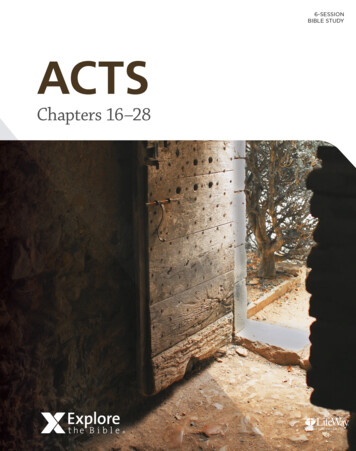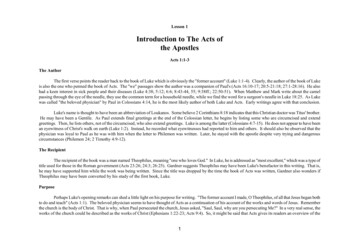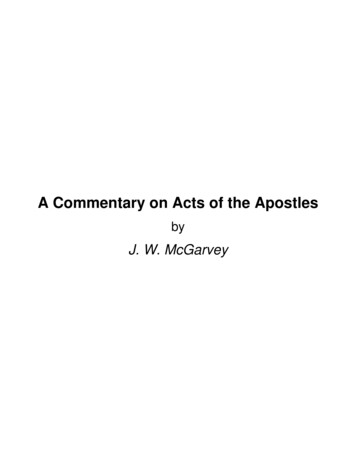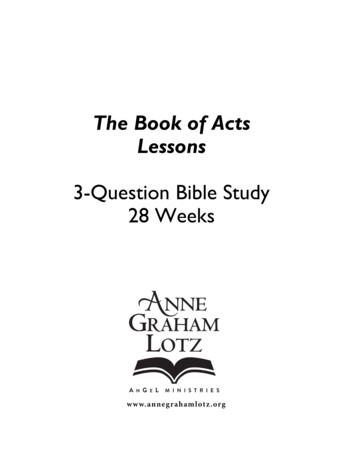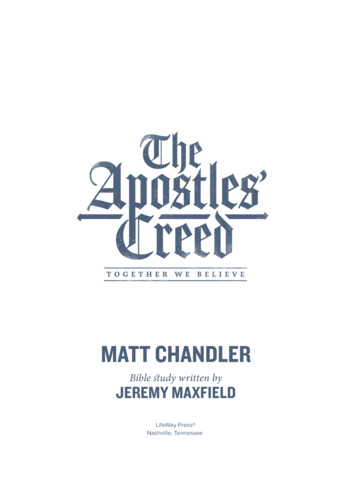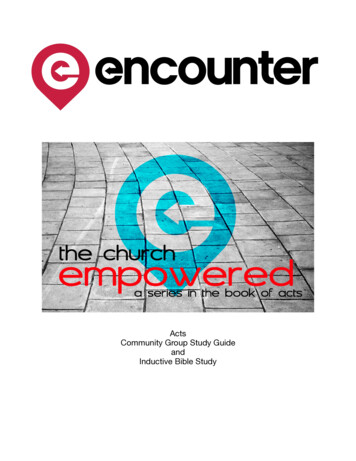
Transcription
To purchase the accompanying PowerPoint ( 20), or to order printed booklets:www.sundayschoolcourses.com/actsTo access this .pdf file on theWeb ts of the Apostles:Background and CommentaryWritten by Robert C. JonesAcworth, Georgia 2009 Robert C. Jones
Christian Theology and History Adult Sunday School CoursesRobert Joneswww.sundayschoolcourses.comI’ve always been a strong believer in adult Sunday School classes and Bible studies in our churches. And manychurches have quality, Biblically-based adult-focused programs. Unfortunately, just as many churches tend todownplay adult education, focusing on children’s education (not a bad thing in itself), or focusing on the needs ofthe “unchurched”, where topics such as church history and theology are often purposely ignored.Yet there is a strong need for adult education focused on both the Bible and the basic tenets and history of theFaith. Among the reasons: Not all adults come from a strong childhood background in the church – adult Sunday School classes/Biblestudies may be their first serious introduction to what Christianity is all aboutChristianity (and especially Evangelical Christianity) is under constant attack from the media and popularculture (movies, music, etc.). We need to give fellow Christians the tools to defend the Faith against attack (or to provide a “ready defense” as Peter says in 1 Peter 3:15)Even adult Christians that have a strong Biblical background often know little about the origins and historyof their FaithTo better meet the needs of adult Christians (both those mature in their Faith, and those just starting out in the“School of Christ”), I’ve written a series of courses that focus on the history of the Christian Church (including theJewish roots), as well as the development of doctrine in the Church. The topics represented in these courses areintended to both further the participant’s walk in the Faith, as well as serve as a starting point for Christian apologetics.While the primary purpose of these courses is for use in churches, they also may be useful for High School and College projects, especially the courses focused primarily on historical aspects.One note: these courses are primarily written from an Evangelical Protestant viewpoint (I come from a ReformedChurch background), but I hope I've given ample time to other points of view throughout the various courses.2
Acts of the Apostles:Background and CommentaryWritten by Robert JonesAcworth, Georgia 2009To purchase the accompanying PowerPoint ( 20), or to order printed booklets:www.sundayschoolcourses.com/actsTo access this .pdf file on theWeb cripture taken from the HOLY BIBLE, NEWINTERNATIONAL VERSION. Copyright 1973,1978, 1984 by International Bible Society. Used bypermission of Zondervan Publishing House."Robert C. JonesPOB 1775Kennesaw, GA choolcourses.com/3
Table of ContentsTABLE OF CONTENTS. 4INTRODUCTION . 5Authority .5Authorship and date .5Quiz .6CHAPTER 1 . 6CHAPTER 2 . 8CHAPTER 3 . 9CHAPTER 4 . 10CHAPTER 5 . 11CHAPTER 6 . 12CHAPTER 7 . 13CHAPTER 8 . 14CHAPTER 9 . 15CHAPTER 10 . 16CHAPTER 11 . 16CHAPTER 12 . 17CHAPTERS 13-14 . 18CHAPTER 15 . 20CHAPTER 16-18 . 21CHAPTERS 19-21 . 24THE ARREST AND TRIALS OF PAUL . 26CHAPTER 22 . 27CHAPTER 23 . 28CHAPTER 24 . 29CHAPTER 25 . 29CHAPTER 26 . 30CHAPTER 27 . 31CHAPTER 28 . 31SOURCES . 33NOTES . 344
IntroductionActs of the Apostles is the grand and exciting story of what is sometimes referred to as the “primitivechurch” – the church of the Apostles. Acts is the story of how the views of an obscure Jewish Messianicgroup spread throughout the Mediterranean and beyond in under two generations. Acts is the story ofthe two greatest evangelizing Apostles – Peter and Paul.The Acts of the Apostles, along with the Gospel of Luke, form one of the great histories of the ancientworld. And the author, Luke the Physician, must rate among the great historians of all time.A note on the format of this course – while I generally follow the typical verse-by-verse format of a Biblecommentary, in the discussions of Paul’s missionary journeys I move to a location-based commentary,rather than a verse-based one.AuthorityUnlike, say, Revelation or 2 John/3 John, there appears to have never been any controversy regardingthe inclusion of Acts in the New Testament canon. Irenaeus in his c. 180 A.D. Against Heresies quotedfrom Acts 194 times. Acts appears in the mysterious Muratori Canon, a fragmentary list (85 lines) datingto c. 200 A.D., named (after its 18th century discoverer, Lodovico Muratori).In Eusebius’ history of the church, written c. 325 A.D., he includes Acts as one of the “accepted” booksof the New Testament canon:THE DIVINE SCRIPTURES THAT ARE ACCEPTED AND THOSE THAT ARE NOT.SINCE we are dealing with this subject it is proper to sum up the writings of the New Testament whichhave been already mentioned. First then must be put the holy quaternion of the Gospels; following themthe Acts of the Apostles. (Ecclesiastical History, Eusebius, Book 3, Chapter 25; emphasis added)Saint Athanasius includes Acts in his 367 A.D. list of books of the New Testament. The below list is theoldest extant list of books that make up our modern day New Testament:5. Again it is not tedious to speak of the [books] of the New Testament. These are, the four Gospels, according to Matthew, Mark, Luke, and John. Afterwards, the Acts of the Apostles and Epistles (called Catholic), seven, viz. of James, one; of Peter, two; of John, three; after these, one of Jude. In addition, thereare fourteen Epistles of Paul, written in this order. The first, to the Romans; then two to the Corinthians;after these, to the Galatians; next, to the Ephesians; then to the Philippians; then to the Colossians; afterthese, two to the Thessalonians, and that to the Hebrews; and again, two to Timothy; one to Titus; andlastly, that to Philemon. And besides, the Revelation of John. (From the thirty-ninth Letter of Holy Athanasius, Bishop of Alexandria, on the Paschal festival, emphasis added)Authorship and dateThe author of Acts has always been viewed as Luke the Physician, a companion of Paul on his Missionaryjourneys (see Col 4:14, 2 Tim 4:11, Philemon 1:24). At least the second part of Acts is probably an eyewitness account. Acts appears to have been the second part of Luke’s great history of the church. Irenaeus, in his c. 180 A.D. Against Heresies, establishes Luke as the author of the Gospel carrying hisname, and also establishes Luke as a companion of Paul:5
"Matthew also issued a written Gospel among the Hebrews in their own dialect, while Peter andPaul were preaching at Rome, and laying the foundations of the Church. After their departure, Mark, thedisciple and interpreter of Peter, did also hand down to us in writing what had been preached by Peter.Luke also, the companion of Paul, recorded in a book the Gospel preached by him. Afterwards, John, thedisciple of the Lord, who also had leaned upon His breast, did himself publish a Gospel during his residence at Ephesus in Asia." (Against Heresies, Irenaeus, Book 3, Chapter 1)Eusebius in his Ecclesiastical History says this of Luke:But Luke, who was of Antiochian parentage and a physician by profession, and who was especially intimate with Paul and well acquainted with the rest of the Apostles, has left us, in two inspired books, proofsof that spiritual healing art which he learned from them. One of these books is the Gospel, which he testifies that he wrote as those who were from the beginning eye witnesses and ministers of the word delivered unto him, all of whom, as he says, he followed accurately from the first. The other book is the Actsof the Apostles which he composed not from the accounts of others, but from what he had seen himself.And they say that Paul meant to refer to Luke’s Gospel wherever, as if speaking of some gospel of hisown, he used the words, “according to my Gospel.” (Eusebius, Book 3, Chapter 4)As to Luke’s death, Martyrs Mirror states:Respecting his end, some write that, while preaching in Greece, he was hanged by the ungodly to a greenolive tree; others relate that he was in the eighty-fourth year of his age, at the time of his death.Acts makes no mention of the Destruction of the Temple in 70 A.D., so it was probably written beforethen. Since it doesn’t refer to the death of Paul, it was probably written before 65/66 A.D., perhaps inthe early 60s A.D.Quiz1. T/F There was great controversy in the early church over whether the Acts of the Apostlesshould be included in the new Testament canon2. T/F Acts records the death of several of the Apostles3. T/F The first great council of the Christian Church, the Jerusalem Council, is recorded in the Actsof the Apostles4. T/F Paul of Tarsus was a follower of Jesus while Jesus was incarnate on earth5. T/F The first apostle to propose a ministry to the Gentiles was Paul6. T/F While Paul was imprisoned in Caesarea and Rome, he was sorely mistreated by his Romancaptors7. T/F While Paul was imprisoned in Caesarea, he tried to bribe the Roman governor to be released8. T/F Paul’s Road to Damascus experience is recounted once in Acts9. T/F The Apostle who makes the final decision regarding the ministry to the Gentiles at the Jerusalem Council is Peter10. T/F Paul went on all three of his missionary journeys with BarnabasChapter 1Chapter 1 of Acts describes the somewhat chaotic time for the Apostles immediately before and afterthe Ascension of Christ.6
Verse 1: The basis for the assumption that the same author wrote both the Gospel of Luke and Acts ofthe Apostles can be seen by comparing the third verse of Luke with the first verse of Acts:Therefore, since I myself have carefully investigated everything from the beginning, it seemed good alsoto me to write an orderly account for you, most excellent Theophilus, so that you may know the certaintyof the things you have been taught. (Luke 1:3-4, NIV; emphasis added)In my former book, Theophilus, I wrote about all that Jesus began to do and to teach (Acts 1:1, NIV;emphasis added)Note that both books are addressed to “Theophilus”, a figure who is not mentioned anywhere else inthe New Testament (he was probably a gentile convert of Paul, but that is all we know about him). Also,note that in Acts 1:1, the author refers to “my former book”.Verse 3: Background on the period following the resurrection, but before the ascension.Verses 4-8: Jesus tells them to wait in Jerusalem, where they will be baptized by the Holy Spirit. Thepower they receive from this baptism will allow them to “be my witnesses in Jerusalem, and in all Judeaand Samaria, and to the ends of the earth.” “To the ends of the earth” is significant, because it authorizes the spreading of the goods news beyond the Jewish community to Gentiles.Verse 9: A description of the Ascension.Verses 10-11: Two “men dressed in white” (probably angels), promise the Apostles that Christ will return some day the same way he ascended. Compare with John 20: 10-13.Verses 12-14: An explicit list of the key members of the earliest Christian Church! Present were theApostles, an unspecified number of his female followers, and his mother and brothers, assumedly including James the Just who would later be (according to Eusebius) the first bishop of Jerusalem:Those present were Peter, John, James and Andrew; Philip and Thomas, Bartholomew and Matthew;James son of Alphaeus and Simon the Zealot, and Judas son of James. They all joined together constantlyin prayer, along with the women and Mary the mother of Jesus, and with his brothers. (Acts 1:12-14, NIV)Verses 15-17: Even before Pentecost, Peter assumes a leadership position in the church. Note that theChristian Church, which numbers about 2 billion members today, had 120 members in c. 30 A.D.!Verses 18-20: The fate of Judas is described (compare with Matthew 27:3-10). Peter discusses the necessity of replacing Judas as one of the Twelve.Verses 21-22: Peter establishes the criteria for becoming one of the Twelve – the replacement musthave been “with us the whole time the Lord Jesus went in and out among us, beginning from John’sbaptism to the time when Jesus was taken up from us.” This criteria effectively made it impossible forlater Apostles (Barnabas, Paul, Andronicus, Junias) to be considered in the “top tier” of the Apostles.This may have led to some of the later animosity between Paul and the Twelve.Verses 23-26: Matthias is chosen as the replacement for Judas Iscariot, using a two-fold mechanism –the Apostles nominate two men (the first church nominating committee!), but leave the final choice toDivine intervention by choosing lots. Some Amish and Mennonites still use this two-fold mechanismtoday for choosing elders.7
One could make the case that this procedure should not have happened prior to the baptism of the HolySpirit, promised by Jesus. After all, Jesus had told the Apostles to go to Jerusalem and wait. PerhapsJames the Just (the brother of Jesus) or Paul was meant to be the Twelfth Apostle. Matthias is nevermentioned again in Acts or anywhere else in the New Testament.Chapter 2Chapter 2 is one of the most important chapters in Acts. It starts out with a description of the Pentecost, and goes on to chronicle the first sermon in the history of the Christian church.Verses 1-4: A glorious description of the Pentecost!1When the day of Pentecost came, they were all together in one place. Suddenly a sound like the blowingof a violent wind came from heaven and filled the whole house where they were sitting. They saw whatseemed to be tongues of fire that separated and came to rest on each of them. All of them were filledwith the Holy Spirit and began to speak in other tongues as the Spirit enabled them. (Acts 2:1-4, NIV)As a result of this baptism of the Holy Spirit, the Apostles are able to speak in other languages. This allows the crowds to hear the Apostles in their own tongues.Acts 2: 5-12: The Pentecost “just happened” to occur at a time when Jerusalem was filledwith “God-fearing Jews from every nation under heaven”. The gathered crowd heard thesound of the Pentecost, and then heard the Apostles speaking to them such that “each ofus hears them in his own native language”. Most of the crowd views this as a miracle,and makes them willing to listen to what the Apostles have to say Acts 2:13: however, some in the crowd accused the Apostles of being drunk.Acts 2: 14-40: Peter preaches the first sermon in the history of the Christian Church. Hebegins by tying the event that just happened to the Hebrew scriptures, book of Joel (“Inthe last days, God says, I will pour out my Spirit on all people” ) He then ties the deathand resurrection of Jesus to the Old Testament prophesy of David:1Library of Congress, LAMB, no. 1656 (B size) [P&P]8
“Therefore my heart is glad and my tongue rejoices; my body also will live in hope, because you will notabandon me to the grave, nor will you let your Holy One see decay.” (Psalm 16:9-10, NIV)Peter then delivers the heart of Christian theology:Therefore let all Israel be assured of this: God has made this Jesus, whom you crucified, both Lord andChrist [Messiah]. (Acts 2:36, NIV)Peter then exhorts the crowd to be baptized, and assures them that “The promise is for you and yourchildren and for all who are far off—for all whom the Lord our God will call” (a little predestination lingo,there).Verse 41: In the first altar call in the history of the church, 3,000 people convert to what will later becalled Christianity.Verses 42-47: These verses describe how the early Christians worshipped and lived, including thesepoints: They devoted themselves to teaching, fellowship, the breaking of bread, and prayer The Apostles performed many wonders and miraculous signs (as Jesus had promised that they’dbe able to do) All believers held everything in common (similar to the Essenes), and sold their possessions togive to the poor They met in the Temple courts, and ate in each others’ homes They continued to increase in numberThis aforementioned communal worship pattern existed only in the primitive Jerusalem church. There isno evidence that it ever appeared in the Gentile church, probably because the Gentile church realizedthat if they sold of all of their possessions and means for generating wealth, they wouldn’t have anymoney for the church to survive on in the future. (The early Jerusalem church believed that Christ’s return was imminent; thus, they probably weren’t focused on a long term “business plan” for the church!)However, this communal form of worship was a model followed by early monastics such as St. Antonyand St. Benedict.Chapter 3In Chapter 3, Peter and John perform a miracle by healing a man that was crippled from birth. As thecrowd forms to view the aftermath of this miracle, Peter turns it into a teaching moment.“Saints Peter and John curing the sick”2Library of Congress LC-DIG-ppmsca-1866592
Verses 12-16: After castigating the crowd for handing Jesus over to be killed, Peter identifies how theman was healed – not through some power of Peter or John, but through faith in Jesus Christ. Note howearly this became a central tenet of Christianity.Verses 17-26: Even though the crowd is guilty of the death of the messiah, there is still time to “Repent,then, and turn to God, so that your sins may be wiped out, that times of refreshing may come from theLord”. In verse 21, Peter addresses what (at the time) was the tricky question of when Christ would return – “He must remain in heaven until the time comes for God to restore everything, as he promisedlong ago through his holy prophets”. The passages end with Peter linking Christ with the Old Testamentprophecies of Moses and Samuel.Chapter 4In Chapter 4, Peter and John are arrested and questioned by the Sanhedrin for the first time. (The Sanhedrin had probably figured that they’d taken care of this Jesus thing when they set in motion the seriesof events that would lead to the crucifixion of Jesus; yet here were his followers stirring up “moretrouble”!)Verse 4: Although jailed by the Sanhedrin, the preaching of Peter and John continues to gain followersto the cause, with 5,000 Christians in existence at this time.Verses 5-7: Peter and John are questioned by the same crew that had earlier questioned Jesus, including Annas and Caiaphas. They ask him, “By what power or what name did you do this?” [heal the crippled man].Verses 8-11: Peter, “filled with the Holy Spirit”, tells the Sanhedrin that “It is by the name of Jesus Christof Nazareth, whom you crucified but whom God raised from the dead, that this man stands before youhealed.” Peter goes on to quote the famous verses from Psalm 118:22, “the stone you builders rejected,which has become the capstone.” This, essentially, was an accusation of murder against the Sanhedrin.Verse 12: The Christian concept of exclusivity of salvation through Christ was present in the earliestdays of the church.Verses 13-17: The Sanhedrin realizes that the miracle actually took place, and that Peter and John were“unschooled, ordinary men”. This latter point is one that helped give early Christianity validity in manypeople’s eyes – how else could a movement that started out with a group of Galilean fisherman spreadso fast and become so prominent, unless by divine intervention?Verses 18-22: The Sanhedrin admonish Peter and John against further preaching, but Peter replies that“we cannot help speaking about what we have seen and heard.”Verses 23-31: After Peter tells the other followers about the threats made to them by the Sanhedrin,the followers pray to God, and are filled (by the Holy Spirit) with an even greater dedication to spreadthe good news.Verse 32-35: A further description of the communal nature of the early church, as well as their charitable efforts. (See commentary on Chapter 2:42-47).10
Verse 36-37: Barnabas (described as an apostle in Acts 14:14) makes his first appearance to Acts. Welearn that his given name is Joseph, he is a Levite from Cyprus, and that the name Barnabas means “Sonof Encouragement”.Barnabas would become an early mentor and sponsor of Paul, introducing him to the Apostles in Jerusalem after Paul’s conversion. Barnabas and Paul spent at least a year in Antioch (Syria), where the term“Christian” was first used. Later, Barnabas would accompany Paul on his first missionary journey, andseems to have been in charge during at least some parts of the journey. He must have been a largeman, because in Lystra, the people mistook him for Zeus!Barnabas and Paul were key participants in the Jerusalem Council described in Acts 15.represented the view that the Gentiles did not have to be circumcised in order to be saved.TheyLater, Barnabas and Paul would part company in a dispute over John Mark, the cousin of Barnabas. JohnMark had “deserted them in Pamphylia” according to Paul, and Paul did not want him to accompanythem on his second missionary journey. It was a “sharp disagreement”, and Paul chose Silas instead ofBarnabas to go with him on his second missionary journey.Chapter 5Verses 1-10: The story of Ananias and Sapphira is one of the more difficult ones in the New Testament.While it is sometimes explained that Ananias and Sapphira died because they didn’t give everything theyowned to the church, Peter gives us two clues that this isn’t the real reason. In the case of Ananias, Peter says that Ananias has “lied to the Holy Spirit”; in the case of Sapphira, Peter asks her how she could“agree to test the Spirit of the Lord”. The issue here is probably blasphemy of the Holy Spirit (Matthew12:31-32, Mark 3:29, Luke 12:10), not how much Ananias and Sapphira decided to put in the collectionplate that morning.The death of Ananias3Verses 11-16: The deaths of Ananias and Sapphira inspired fear and awe in the people. More and morepeople joined the church, and more and more people came to the Apostles (especially Peter) for healing.Verses 17-26: Because of the success of their preaching, the Apostles are arrested and jailed by theSanhedrin (this would be the second arrest of Peter and John in a short time). The Apostles are rescuedfrom prison by divine intervention – “an angel of the Lord”, and return to preaching.3Library of Congress LC-DIG-ppmsca-1864911
Verses 27-32: Once again the Apostles are brought before the Sanhedrin and questioned and berated.Once again, Peter takes a leadership role, replying, “We must obey God rather than men!”Verse 30 has an interesting parallel in the Dead Sea Scrolls. Verse 30 makes reference to Jesus “whomyou had killed by hanging him on a tree.” In a seeming messianic reference in the Dead Sea Scroll4Q541, it states “do not afflict the weak by wasting or hanging.[Let] not the nail approach him.”4Q541 “He will atone for all the children of his generation, and he will be sent to all the children of his[pe]ople. His word is like a word of heaven, and his teaching is in accordance with the will of God. Hiseternal sun will shine, and his light will be kindled in all the corners of the earth, and it will shine in thedarkness. Then the darkness will pass away [fr]om the earth, and thick darkness from the dry land.They will speak many words against him, and they will invent many [lie]s and fictions against him andspeak shameful things about him. Evil will overthrow his generation.His situation will be one of lying andviolence [and] the people will go astray in his days, and be confounded.and do not afflict the weak by wasting or hanging.[Let] not the nail approach him.” (Translationfrom The Suffering Servant at Qumran, John J. Collins, Bible Review, Dec. 1993; emphasis added)Verses 33-39: We sometimes assume that all Pharisees were against Jesus and his followers, but this isnot entirely true. At one point in Luke, the Pharisees warn Jesus that Herod wants to kill him. A prominent Pharisee on the Sanhedrin, Nicodemus, is a follower of Jesus. Acts 15 records that there were Pharisees among the early Christian Church. And, of course, Paul announces on several occasions withsome pride that he was trained as a Pharisee. In the reference here, the Apostles are released fromprison by the intervention of the Pharisee Gamaliel, under whom Paul studied. Gamaliel, along withRabbi Hillel, is often considered to be the founder of Rabbinical Judaism.Chapter 6In this chapter, the first deacons in the church are appointed.Verse 1: Verse 1 shows that divisions were already creeping into the nascent church (and Acts makes noattempt to whitewash these divisions). In this case, the divisions are between the Grecian Jews (Hellenized Jews) and the Hebraic Jews, over the distribution of alms to widows.Verses 2-4: The Apostles decide to appoint a committee of believers to look after the distribution ofalms. The criteria for this new position (later to be called “deacon”) is to be “known to be full of theSpirit and wisdom”.Verse 5: The first deacons in the church are appointed: “Stephen, a man full of faith and of the HolySpirit; also Philip [probably not Philip the apostle], Procorus, Nicanor, Timon, Parmenas, and Nicolasfrom
Acts is the story of how the views of an obscure Jewish Messianic group spread throughout the Mediterranean and beyond in under two generations. Acts is the story of the two greatest evangelizing Apostles – Peter and Paul. The Acts of the Apostles, along with the Gospel of Lu
